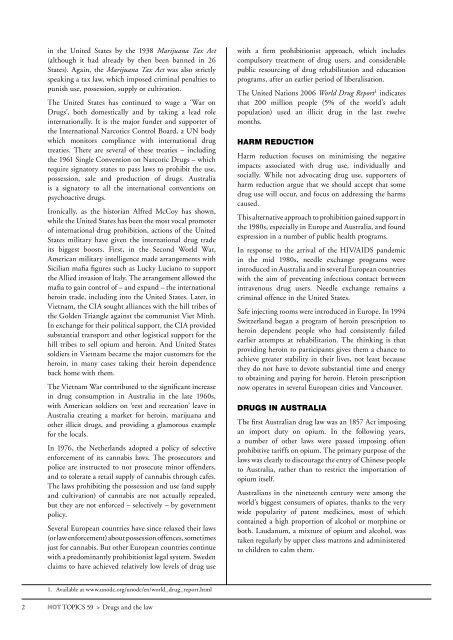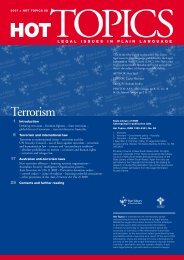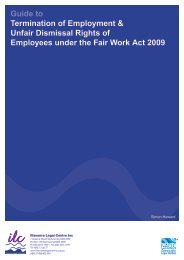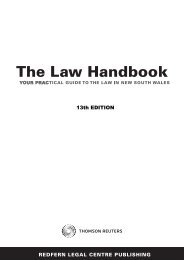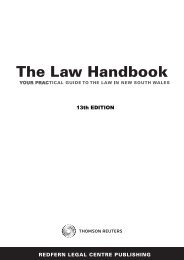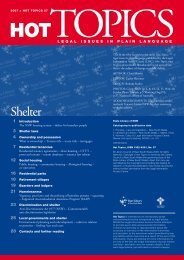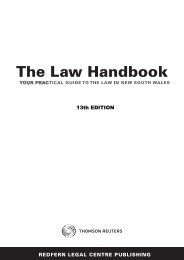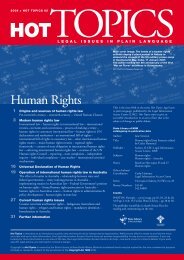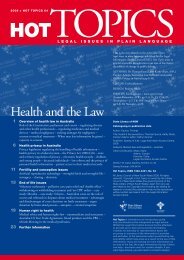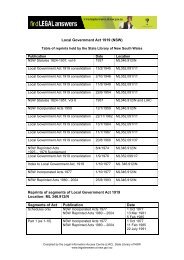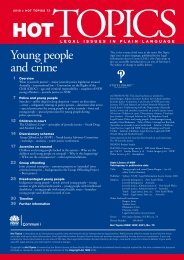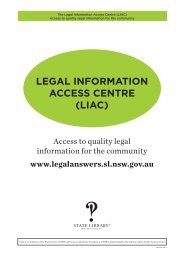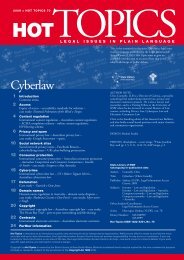Drugs and the law - Hot Topics 59 - Find Legal Answers
Drugs and the law - Hot Topics 59 - Find Legal Answers
Drugs and the law - Hot Topics 59 - Find Legal Answers
Create successful ePaper yourself
Turn your PDF publications into a flip-book with our unique Google optimized e-Paper software.
in <strong>the</strong> United States by <strong>the</strong> 1938 Marijuana Tax Act(although it had already by <strong>the</strong>n been banned in 26States). Again, <strong>the</strong> Marijuana Tax Act was also strictlyspeaking a tax <strong>law</strong>, which imposed criminal penalties topunish use, possession, supply or cultivation.The United States has continued to wage a ‘War on<strong>Drugs</strong>’, both domestically <strong>and</strong> by taking a lead roleinternationally. It is <strong>the</strong> major funder <strong>and</strong> supporter of<strong>the</strong> International Narcotics Control Board, a UN bodywhich monitors compliance with international drugtreaties. There are several of <strong>the</strong>se treaties – including<strong>the</strong> 1961 Single Convention on Narcotic <strong>Drugs</strong> – whichrequire signatory states to pass <strong>law</strong>s to prohibit <strong>the</strong> use,possession, sale <strong>and</strong> production of drugs. Australiais a signatory to all <strong>the</strong> international conventions onpsychoactive drugs.Ironically, as <strong>the</strong> historian Alfred McCoy has shown,while <strong>the</strong> United States has been <strong>the</strong> most vocal promoterof international drug prohibition, actions of <strong>the</strong> UnitedStates military have given <strong>the</strong> international drug tradeits biggest boosts. First, in <strong>the</strong> Second World War,American military intelligence made arrangements withSicilian mafia figures such as Lucky Luciano to support<strong>the</strong> Allied invasion of Italy. The arrangement allowed <strong>the</strong>mafia to gain control of – <strong>and</strong> exp<strong>and</strong> – <strong>the</strong> internationalheroin trade, including into <strong>the</strong> United States. Later, inVietnam, <strong>the</strong> CIA sought alliances with <strong>the</strong> hill tribes of<strong>the</strong> Golden Triangle against <strong>the</strong> communist Viet Minh.In exchange for <strong>the</strong>ir political support, <strong>the</strong> CIA providedsubstantial transport <strong>and</strong> o<strong>the</strong>r logistical support for <strong>the</strong>hill tribes to sell opium <strong>and</strong> heroin. And United Statessoldiers in Vietnam became <strong>the</strong> major customers for <strong>the</strong>heroin, in many cases taking <strong>the</strong>ir heroin dependenceback home with <strong>the</strong>m.The Vietnam War contributed to <strong>the</strong> significant increasein drug consumption in Australia in <strong>the</strong> late 1960s,with American soldiers on ‘rest <strong>and</strong> recreation’ leave inAustralia creating a market for heroin, marijuana <strong>and</strong>o<strong>the</strong>r illicit drugs, <strong>and</strong> providing a glamorous examplefor <strong>the</strong> locals.In 1976, <strong>the</strong> Ne<strong>the</strong>rl<strong>and</strong>s adopted a policy of selectiveenforcement of its cannabis <strong>law</strong>s. The prosecutors <strong>and</strong>police are instructed to not prosecute minor offenders,<strong>and</strong> to tolerate a retail supply of cannabis through cafes.The <strong>law</strong>s prohibiting <strong>the</strong> possession <strong>and</strong> use (<strong>and</strong> supply<strong>and</strong> cultivation) of cannabis are not actually repealed,but <strong>the</strong>y are not enforced – selectively – by governmentpolicy.Several European countries have since relaxed <strong>the</strong>ir <strong>law</strong>s(or <strong>law</strong> enforcement) about possession offences, sometimesjust for cannabis. But o<strong>the</strong>r European countries continuewith a predominantly prohibitionist legal system. Swedenclaims to have achieved relatively low levels of drug usewith a firm prohibitionist approach, which includescompulsory treatment of drug users, <strong>and</strong> considerablepublic resourcing of drug rehabilitation <strong>and</strong> educationprograms, after an earlier period of liberalisation.The United Nations 2006 World Drug Report 1 indicatesthat 200 million people (5% of <strong>the</strong> world’s adultpopulation) used an illicit drug in <strong>the</strong> last twelvemonths.HarM reducTiOnHarm reduction focuses on minimising <strong>the</strong> negativeimpacts associated with drug use, individually <strong>and</strong>socially. While not advocating drug use, supporters ofharm reduction argue that we should accept that somedrug use will occur, <strong>and</strong> focus on addressing <strong>the</strong> harmscaused.This alternative approach to prohibition gained support in<strong>the</strong> 1980s, especially in Europe <strong>and</strong> Australia, <strong>and</strong> foundexpression in a number of public health programs.In response to <strong>the</strong> arrival of <strong>the</strong> HIV/AIDS p<strong>and</strong>emicin <strong>the</strong> mid 1980s, needle exchange programs wereintroduced in Australia <strong>and</strong> in several European countrieswith <strong>the</strong> aim of preventing infectious contact betweenintravenous drug users. Needle exchange remains acriminal offence in <strong>the</strong> United States.Safe injecting rooms were introduced in Europe. In 1994Switzerl<strong>and</strong> began a program of heroin prescription toheroin dependent people who had consistently failedearlier attempts at rehabilitation. The thinking is thatproviding heroin to participants gives <strong>the</strong>m a chance toachieve greater stability in <strong>the</strong>ir lives, not least because<strong>the</strong>y do not have to devote substantial time <strong>and</strong> energyto obtaining <strong>and</strong> paying for heroin. Heroin prescriptionnow operates in several European cities <strong>and</strong> Vancouver.drugs in ausTraliaThe first Australian drug <strong>law</strong> was an 1857 Act imposingan import duty on opium. In <strong>the</strong> following years,a number of o<strong>the</strong>r <strong>law</strong>s were passed imposing oftenprohibitive tariffs on opium. The primary purpose of <strong>the</strong><strong>law</strong>s was clearly to discourage <strong>the</strong> entry of Chinese peopleto Australia, ra<strong>the</strong>r than to restrict <strong>the</strong> importation ofopium itself.Australians in <strong>the</strong> nineteenth century were among <strong>the</strong>world’s biggest consumers of opiates, thanks to <strong>the</strong> verywide popularity of patent medicines, most of whichcontained a high proportion of alcohol or morphine orboth. Laudanum, a mixture of opium <strong>and</strong> alcohol, wastaken regularly by upper class matrons <strong>and</strong> administeredto children to calm <strong>the</strong>m.1. Available at www.unodc.org/unodc/en/world_drug_report.html2HOT TOPICS <strong>59</strong> > <strong>Drugs</strong> <strong>and</strong> <strong>the</strong> <strong>law</strong>


